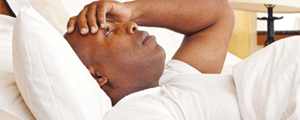
Insomnia, from the Latin in (not) and somnus (sleep), is a condition characterised by difficulty falling asleep and remaining asleep. It includes a broad spectrum of sleep disorders, from lack of quantity of sleep to lack of quality of sleep.
Medical News Today
Insomnia is often separated into three types. Transient insomnia occurs when symptoms last from a few days to a few weeks. Acute or short-term insomnia is when symptoms last for several weeks. Chronic insomnia is characterised by insomnia that lasts for months and years.
Insomnia can affect all age groups and is more common in adult women than adult men. The condition can lead to poor performance at work or school, obesity, depression, anxiety, poor immune system function, reduced reaction time, and an increased risk and severity of long-term disease.
Researchers from the University of Pittsburgh reported in the journal Sleep in October 2012 that lack of sleep during a person’s teenage years increases the risk of developing diabetes type 2.
Causes of insomnia Insomnia can be caused by physical factors as well as psychological factors. There is often an underlying medical condition that causes chronic insomnia, while transient insomnia may be due to a recent event or occurrence. Causes of insomnia include:
Drugs, alcohol, and medicines: caffeine, nicotine, alcohol, stimulants, antidepressants, heart and blood pressure medications, allergy medicines, decongestants, weight-loss medicines, antihistamines, cocaine, ephedrine, amphetamines, methamphetamine, fluoroquinolone antibiotic drugs Disruptions in circadian rhythm: jet lag, job shift changes, high altitudes, noisiness, hotness or coldness.
Psychological issues: stress, anxiety, depression, mania, schizophrenia Medical conditions: brain lesions and tumours, stroke, chronic pain, chronic fatigue syndrome, congestive heart failure, angina, acid-reflux disease, chronic obstructive pulmonary disease, asthma, sleep apnea, Parkinson’s and Alzheimer’s diseases, hyperthyroidism and arthritis.
- Chamisa under fire over US$120K donation
- Mavhunga puts DeMbare into Chibuku quarterfinals
- Pension funds bet on Cabora Bassa oilfields
- Councils defy govt fire tender directive
Keep Reading
Hormones: estrogen, hormone shifts during menstruation Other factors: sleeping next to a snoring partner, parasites, genetic conditions, overactive mind and pregnancy.
Who gets insomnia? Some people are more likely to suffer from insomnia than others. These include: travellers, shift workers with frequent changes in shifts, the elderly, drug users, adolescent or young adult students, pregnant women, menopausal women and those with mental health disorders. Symptoms of insomnia Insomnia itself may be a symptom of an underlying medical condition. However, there are several signs and symptoms that are associated with insomnia.
Difficulty falling asleep at night, awakening during the night, awakening earlier than desired, still feeling tired after a night’s sleep, daytime fatigue or sleepiness, irritability, depression or anxiety, poor concentration and focus, being unco-ordinated, an increase in errors or accidents, tension headaches, difficulty socialising, gastrointestinal symptoms and worrying about sleeping. How is insomnia diagnosed?
A sleep specialist usually will begin a diagnostic session by asking a battery of questions about your medical history and sleep patterns. A physical exam may be conducted to look for conditions that may be causing insomnia. Similarly, physicians may screen for psychiatric disorders and drug and alcohol use. A sleep specialist may request that you keep a sleeping diary.
Treating insomnia Some types of insomnia resolve themselves when the underlying cause is removed or wears off. In general, treating insomnia focuses on determining the cause of the sleeping problems. Once identified, this underlying cause can be properly treated or corrected. In addition to treating the underlying cause of insomnia, both medical and non-pharmacological (behavioural) treatments may be employed as adjuvant therapies.
Non-pharmacological approaches: Improving “sleep hygiene” — don’t over- or under-sleep, exercise daily, don’t force sleep, try to maintain a regular sleep schedule, avoid caffeine at night, do not smoke, do not go to bed hungry, make sure the environment is comfortable Using relaxation techniques — such as meditation and muscle relaxation Cognitive therapy – one-on-one counselling or group therapy.
Stimulus control therapy — only go to bed when sleepy, refrain from TV, reading, eating, or worrying in bed, set an alarm for the same time every morning, avoid long daytime naps.
Sleep restriction — decrease the time spent in bed and partially deprive your body of sleep so you are more tired the next night.
Medical treatments include: prescription sleeping pills, antidepressants, over-the-counter sleep aids and antihistamines.











